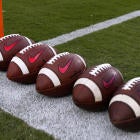KANSAS CITY, Mo. -- The National Association of Intercollegiate Athletics (NAIA) will consider name, image and likeness legislation that would essentially allow unlimited outside compensation for athletes based on their fame.
Schools in the small-college organization recently received proposed legislation that removes the word "reasonable" from previous NAIA rules that allowed athletes "reasonable compensation for use of name, image and likeness …"
In considering the change, NAIA commissioner Jim Carr said it would be difficult for his organization "to determine what's reasonable and what's not" going forward.
In addition, NAIA athletes -- unlike those governed by the NCAA -- could represent their schools while earning that outside compensation.
Such legislation would be considered far less controversial than an NCAA version. Due to economic and professional issues, the NCAA continues to wrestle with the name, image and likeness concept. In general, the NCAA does not allow such compensation. A working group is expected next month to make recommendations to the NCAA Council relaxing some of those restrictions.
The NAIA proposal is expected to be less restrictive than what will eventually be adopted by the NCAA. The NAIA legislation is similar to the California law due to go into effect in 2023, having limited restrictions and allowing athletes to have an agent.
If the measure passes, the NAIA would be the first college organization to allow athletes to earn money from outside entities based on their notoriety. That would include compensation for "participating in radio or television programs for the purpose of promoting an amateur athletic event."
Carr was asked whether the NAIA legislation might be a template for the NCAA.
"Certainly people outside the NAIA will pay attention," he said. "Whether it will influence others, I'm not really sure. They're facing some different issues and challenges than we are at Division I anyway. I hope they'll at least pay attention to what we're doing.
Referring to 30-plus states at least considering NIL laws, Carr added: "There's a little bit of the factor we're going to be forced to do this at some time point anyway. Might as well get out and do it on [our] terms than being told what to do."
The NAIA legislation was to be voted on by the NAIA membership at the organization's convention April 1 in Kansas City. Now, because of concerns over the coronavirus pandemic, the meeting will most likely be moved online. The proposal would need a simple majority of the registered delegates representing those 251 schools to pass.
The NAIA already has made concessions in its amateur code for Central Methodist University defensive back Toni Harris, the first female scholarship position player in college football who has been a part of two Super Bowl commercials. She has professional representation including a marketing agent in the United Kingdom.
The NIL pressures are more significant in the NCAA than the NAIA. Granting NIL rights would be a major concession in the NCAA because of its strict adherence to the "collegiate model."
NCAA scholarships are capped at room, board, books, tuition and cost of attendance. Granting NIL rights would allow third-party influence but also remove what NCAA critics consider illegal caps on athletes' ability to maximize their worth.
The 80-year-old NAIA is made up of small colleges and universities that don't have the athletic resources, scholarships or revenue of the top-level NCAA schools.
"I think it's the idea that the vast majority -- almost all -- of our student-athletes are not getting full scholarships," Carr said. "If they can go out make a little extra money to pay for the rising cost of education, then it's something we should allow them to do. For us, the risk of creating a recruiting advantage because of booster or influences like that are much smaller than it is at the highest levels of the NCAA."
The NAIA is most famous for its basketball tournament played annually in Kansas City. The tournament was established for small colleges by James Naismith in 1937. That was two years before the NCAA Tournament began.
Before coronavirus caused its cancellation this month, the NAIA Tournament was the nation's longest continuously-running basketball tournament.
















